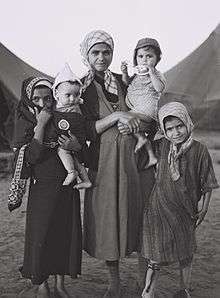The Kedmi Commission

The Kedmi Commission also known as The Cohen-Kedmi Commission was set up in 1995 during the Israel prime minister Yitzhak Rabin to investigate the missing of hundreds of new born Jewish babies, most of those belonging to Mizrahi Jews migrated from Yemen to newly created state of Israel between 1948 and 1954 through the Operation Magic Carpet (Yemen).[1][2][3]
History
The first reported incident of missing children was publicly reported in 1950, when the Association of Yemenis in Israel demanded the police to investigate the disappearance of hundreds of Yemeni children who were considered dead, but the burial place was not known and death certificates were not issued. The first official investigation The Minkovski-Bahlul Commission was set up in 1967, the commission's findings revealed that it had reviewed 342 cases and according to the Commission, 316 missing children died, 2 were adopted, and the fate of the rest were never known or mentioned in the records. The Yemeni community was dissatisfied with the commissions findings, thus resulted in ordering a second commission in 1988 the Shalgi Commission. The Commission reviewed 301 cases and concluded that most of them had died during and after birth, and could not establish a conclusion of 65 cases. [4]
The Kedmi Commission; was commissioned during the Prime minister Yitzhak Rabin, in the year 1995 (after the unsuccessful conclusion of the Minkovski-Bahlul Commission and the Shalgi Commission) the commission's finding were publicly released in November 2001. Initially the commission was headed by retired Judge Yehuda Cohen as well as two other members retired Judge Dalia Kobel and Major General David Maimon. During March 1999 Yehuda Cohen the head of the commission was legitimately replaced by Supreme Court Judge Yaacov Kedmi, giving it the name the Cohen-Kedmi commission or simply The Kedmi Commission.[1][2][3] The commission concluded in its report that most of the children had died of illnesses, while some of those were adopted, the commission also rejected the state sponsored or institutional conspiracy in disappearing of children. A research scholar Shoshana Madmoni-Gerber—( author of "Israeli Media and the Framing of Internal Conflict: the Yemenite Babies Affair, 2009) had concluded in her book with hundreds of testimonies that the disappearance of babies was a state sponsored conspiracy.[5][6]
In June 2016, Benjamin Netanyahu the Prime Minister of Israel had appointed Tzachi Hanegbi-(in charge of National Security and Foreign Affairs) to reopen the files to discover the truth. According to Washington Post in July 2016, Hanegbi updated media that after looking at material from government inquiries into the matter, he is now sure that hundreds of Yemeni children were taken away from their parents, although he could not say why or where they went.[7]
See also
References
- 1 2 Cook, Jonathan (5 August 2016). "The shocking story of Israel's disappeared babies". Al Jazirah (newspaper). Retrieved 9 August 2016.
- 1 2 Madmoni-Gerber, Shoshana (2009). Israeli Media and the Framing of Internal Conflict: The Yemenite Babies Affair. Springer. ISBN 9780230623217. Retrieved 9 August 2016.
- 1 2 Harbon, Claris (2011). "Revealing the past-breaking the silence" (PDF). Edinburgh University Press. Retrieved 9 August 2016.
- ↑ "The tragedy of the Yemenite aliyah: 70 years later, the fate of thousands of missing children is unknown". News Israel today. 21 June 2016. Retrieved 9 August 2016.
- ↑ Ein-Gil, Ehud (9 July 2016). "Decades later, disappearance of 1,000 children in Israel remains a mystery". Haaretz. Retrieved 9 August 2016.
- ↑ Madmoni-Gerber, Shoshana (12 July 2013). "The Yemenite Baby Affair: What if this was your child?". +972 Magazine. Retrieved 9 August 2016.
- ↑ Eglash, Ruth (8 August 2016). "A 70-year-old mystery: Yemeni Jews say young relatives were stolen in Israel". The Washington Post. Retrieved 9 August 2016.
External links
- A 70-year-old mystery: Yemeni Jews say young relatives were stolen in Israel, Washington Post, 8 August 2016
- The Babies From Yemen: An Enduring Mystery, The New York Times, 2 September 1997